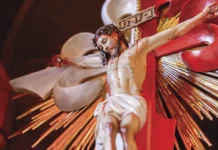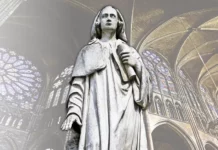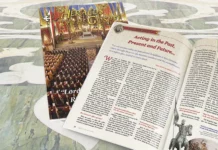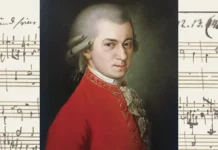For today’s mentality, so averse to suffering, the martyrdom of St. Engrácia of Braga is nothing more than an episode worthy of tears and grief… However, this is not how the Church considers it.
It is eleventh-century Spain.1 A shepherd waters his sheep near the Guadiana River. Suddenly, he notices something shining with a brilliant light in the depths of the water… Astounded, the herdsman runs to ask for help from some people nearby, and they soon retrieve the “object” that emanated so much light: a human head, intact and radiant!
It was later learned that it belonged to a young Christian girl called Engrácia. While still a child, moved by sincere devotion, she had made a vow of virginity. However, following the customs of the time, her father eventually promised her in marriage. Distressed by the possibility of being forced to break her vow, the young woman fled towards Castile.
Upon learning of what had happened, her fiancé was furious and set out after her. He found Engrácia amid the hills, near present-day Carbajales de Alba, and seized by an unbridled hatred, beheaded her. To evade accusation, he kept the head of his innocent victim and, on his return route, cast it into the water near the city of Badajoz, to the south, where it was later miraculously found.
For those without faith, this story is likely to be seen as sad or depressing. Viewed through supernatural eyes, however, it tells of a splendid victory of chastity over concupiscence, and of virtue against sin.
How difficult it is for today’s world, with a mentality so averse to suffering, to understand the beauty of martyrdom suffered for love of God! It is unthinkable, for contemporary humanity, that someone should be willing to face death to defend his Faith and his ideals; to declare the contrary is to be considered “crazy” or “fanatical”.
But what, in the end, is the meaning of the life sacrifice of so many Christians martyred throughout history? Were they just deranged radicals, who threw their own lives away?
What is the true value of their holocaust?
Gaze fixed on eternity!
Just as an eagle only finds the reason for its existence defying the skies and contemplating the sun in all its splendour, human life only finds its true explanation when considered in relation to eternity.
The journey through this valley of tears is, for every man, a mere passage during which he must fight and acquire merits in order to conquer the heavenly homeland. True life is that lived with one’s brothers and sisters, the righteous, members of God’s family!
From this supernatural perspective, it is easy to understand the heroism of the martyrs. They “were tortured, refusing to accept release, that they might rise again to a better life” (Heb 11:35). They did not place their hope in this ephemeral life, but in that incorruptible, undefiled and imperishable inheritance reserved for them in Heaven (cf. 1 Pt 1:4).
They knew that “what is sown is perishable, what is raised is imperishable. It is sown in dishonour, it is raised in glory. It is sown in weakness, it is raised in power” (1 Cor 15:42-43). Thus, in a supreme act of love for God, they chose to keep their faith intact and to reject the deceptive invitations to sin. Undaunted by the shortening of their days in this miserable land of exile, they rejoiced instead at being able to reach the eternal Kingdom of Heaven with glorious promptness!
Those who fasten their hearts to this world and make the pleasures of this life their ultimate end are not capable of understanding the grandeur of this gesture. They are like eagles without wings, frustrated, with no future other than perpetual death…
Now Scripture teaches that “the ungodly will be punished as their reasoning deserves […]. Their hope is vain, their labours are unprofitable, and their works are useless. […] Even if they live long they will be held of no account, and finally their old age will be without honour. If they die young, they will have no hope and no consolation in the day of decision” (Wis 3:10-11, 17-18).
“Quæ utilitas in sanguine eorum?”2
In God’s eyes, the death of a martyr is more precious than a thousand lives spent without fear of Him. “The form of this world is passing away” (1 Cor 7:31) for everyone. Blessed, then, are those who know how to detach themselves from their lives for Jesus!
Like the Martyrdom suffered by Christ, the blood shed by the martyrs in intimate union with Him obtains from God for the entire Church – whether suffering, militant or triumphant – outstanding graces and most precious gifts which can even change the course of history.
Indeed, behind the fidelity of a St. Clare, who drove hundreds of infidels away from her convent in terror, or of an illustrious St. Louis IX, who sanctified the Kingdom of France and undertook arduous crusades, is there not perhaps the supernatural merit of the blood of a St. Engrácia? Might she not have contributed abundantly, with her unpretentious generosity, to the correspondence and perseverance of these and so many other magnificent vocations? It is not illicit to imagine so.
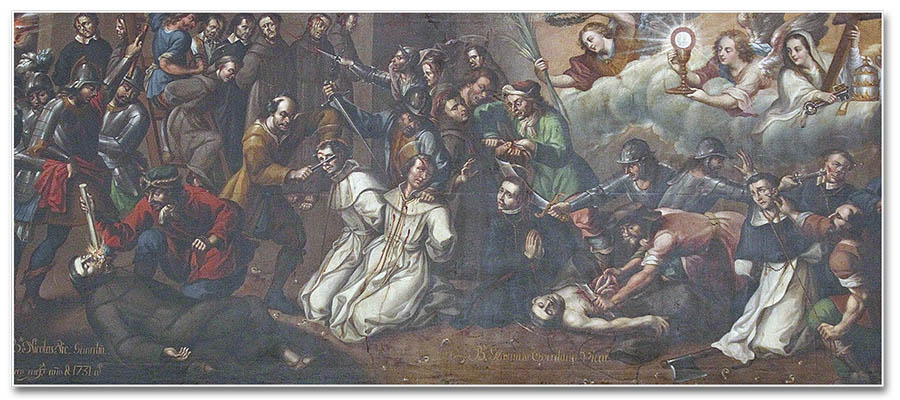
Let us be martyrs of love!
In the midst of the uncertainties of this life, we are often assailed by sufferings, great or small, physical or spiritual. In these moments, let us remember: what made the sacrifice of the martyrs and of all the Saints pleasing to God was not so much the torments they endured but above all the crystalline love with which they made their immolation.
The slightest difficulty we face, the simplest sacrifice made in the course of our daily lives, if imbued with ardent charity, will be received by God as a pleasing oblation. He will accept it as a precious “martyrdom” and will use these offerings to pour out graces upon our brothers and sisters in the Faith and to foster the triumph of the Holy Church.
If our heart is inflamed with love, even if we do not have the occasion to shed our blood in a physical martyrdom, we will be worthy to be counted among the number of Christ’s ardent living hosts. Temples of the Holy Spirit, we will be spectacles of heroism, angelic souls of which the world is not worthy! (cf. Heb 11:38).
Harvested by God as a most pleasing sacrifice of sweet odour, our acts imbued with love will make of us brilliant lights for all eternity! ◊



